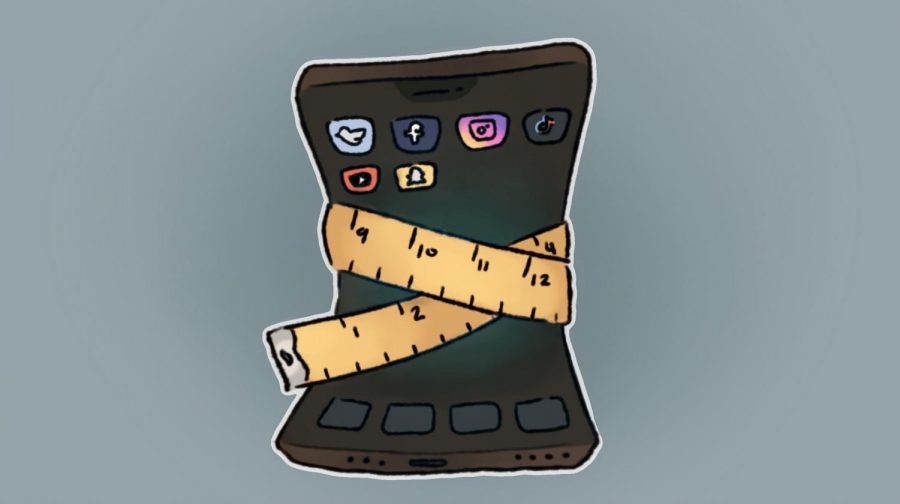

Marissa Slowinski
Opinion Editor
With social media being an everyday staple in people across the world’s lives, and only showing signs of rising in popularity, lives have been impacted drastically, sometimes for the worst.
Negative body-image plagues millions, and social media is partially to blame with setting unrealistic expectations and “flawless” personas. Social media provides constant stimulation, being a key factor in the epidemic that is plaguing the way we view ourselves, especially in the younger generation.
Erin Hedger, in a medically-reviewed “Insider” article, states how “social media is filled with people presenting themselves in their best light, it can be difficult to avoid images and messages that might make you feel negatively about your body.”
Having these feelings of body dissatisfaction can lead to severe health concerns, such as disordered eating and a plethora of mental health issues. One way that social media impacts its users body-image is through unhealthy comparisons through idealizing certain body types.
A 2015 study even showed that women who used Facebook more suffered with more negative feelings about their body. Then, in a 2021 study, it showed how the more users compared themselves to people they followed on social media, the more dissatisfied they became with their bodies, according to Hedger.
Photoshop and filters worm their way into almost every post on social media, setting more unrealistic expectations. Jill M. Emanuele, PhD, the senior director of the Mood Disorders Center at the Child Mind Institute, says how Photoshop and filters make a contorted fantasy of what we “should” look like. Even editing your own photos can promote negative body-image, actually emphasizing your “flaws” and trying to correct them; this can lead to hyper- fixation on your perceived flaws.
In a four week long study to determine whether social media use impacts body-image, a sample group of 220 graduate students between the ages of 17 and 25 cut down their social media use to see how they felt with less screen-time. On the first week of this study, they did their normal amount of scrolling, but as the weeks went by they cut their time in half each week.
According to Dr. Gary Goldfield the results “showed that reducing social media use yielded significant improvements in appearance and weight esteem in distressed youth with heavy social media use.” Interestingly, gender did not play a role in the results of yielding social media exposure.
Social media impacts boys’ body image negatively, increasing those who suffer with Bigorexia, a mental health condition where boys see themselves as “skinny ‘” or “weak,” despite having a normal, muscular physique. This can be brought upon by weightlifting videos, and gym culture across social media platforms.
Teenagers specifically are impacted by these expectations being set online. Exercise videos and “perfect” bodies are blatantly promoted whenever you open any social media platform. According to a 2015 report in the “International Journal for Disordered Eating” men are less likely to open up and seek treatment about the various body-image disorders that they could be suffering from.
In a New York Times article teenagers gave their own insight into how social media affects them, personally. Katie from Great Neck, NY stated how women online appear to be flawless, with participating in “that girl” and “small waist” trends, specifically on TikTok. Katie also says how despite her working out regularly and living an, overall, healthy lifestyle she still finds herself wondering why she can’t look like these women online. She specifically points to diet and exercise videos, and even found herself wondering “if just a little overexercising or a little starvation could pay off.”
There are some positives to social media with various movements to stop these unrealistic expectations. Many people have opened up about their own insecurities, posting unfiltered, natural pictures to combat the idealized body-type.
There are many body-positive communities who expose the pressures in today’s society to look perfect, in turn, creating a safe space where all bodies are loved and accepted. Some tips to avoid social-media burnout and negative body image are to take a break, limit screen time, have open discussions with your friends and family about how social media is impacting you, unfollow accounts, and to find a community who shares your values and beliefs. There are many sides of the internet who want to promote positive thinking, and dismantle the way social media causes negative body-image.
Email Marissa at: mslowinski@live.esu.edu
